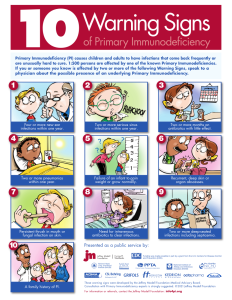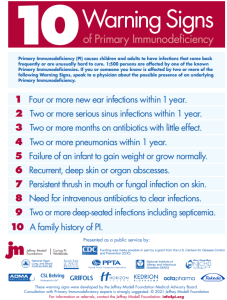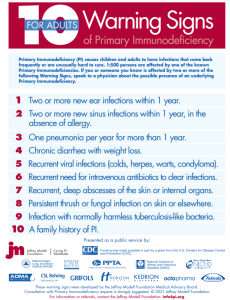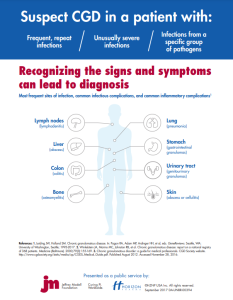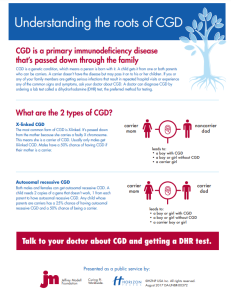What is PIDD?
- What is PIDD? PIDD stands for Primary Immunodeficiency Diseases. These diseases are a group of more than 500 rare, chronic disorders in which part of the body’s immune system is missing or functions improperly. Because the immune system is compromised, people with PIDD are more vulnerable to infections, and they may suffer from these infections more frequently and severely than the general population. Because the disease are rare, it is important for us to educate and disseminate the information. An average adult with PIDD has symptoms and medical care for 5-10 years before they are diagnosed with a PIDD. PIDD diseases and their recognition is on the rise. Life saving treatments and therapies to reduce infection, complications, and prolong life are more available than ever before.
- When do PIDD disorders affect a person? Primary immunodeficiencies can vary significantly in their severity and at what age they appear. Some may be present at birth or in early childhood, while others may not become apparent until later in life. The immune system is complex and problems with immune function can affect each individual differently. Some people have milder forms of a disease and others may have severe forms, even in the same family or between twins that share the same DNA. The environment, life experiences, and infection history also affects how a disease can manifest or progress.
- What are the symptoms and signs of PIDD? Symptoms can range from frequent ear infections, sinusitis, and pneumonia, to more severe conditions like autoimmunity or an increased risk of cancers. The Jeffrey Modell Foundation has some helpful information in assisting in identification of those at risk for PIDD.
How you do treat PIDD?
Treatment for PIDD depends on the type and severity of the disorder and may include measures to prevent and treat infections, boost the immune system with infusions of Immunoglobulin (IVIG or SCIG), other specialized medicines and biologics that modify the immune system, and in some cases, stem cell transplantation. Research and understanding of these diseases have grown significantly in recent years, leading to better management and quality of life for those affected. It takes a team approach of multiple specialists, along with a primary care doctor, to care for a complex PIDD patient. Our team at MASA, take aggressive and exacting approaches, with our physicians like Dr. Siri, Crabtree, and Skillrud at the helm, who work with our outstanding NPs and PA, nurses, infusion staff, and care managers to manage many complex patients. Knowing that a team-based approach is essential, we work with many specialists in our community and at referral centers to get you the care you need and deserve.
- Reach Out for Support and Guidance from Expert Immunologists. Although all allergists are trained during their fellowship, not all allergists actively practice and have expertise in immunology. It is worth having one of our trained providers see you or your family member, even if you have seen another allergist. There are also many other associated physicians who see “allergy” patients, like ENT surgeons, pulmonologists, etc. and while they may be good at what they do, usually do not have the expertise in immunological diseases. If you, or someone you care about, are experiencing health concerns that resonate with challenges discussed in this article, we strongly encourage you to reach out for our support. Navigating the complexities of health issues, particularly those that might be rare or less understood like Primary Immunodeficiency Diseases (PIDD), can be daunting. Our Board-Certified Allergist/Immunologists are here to provide guidance, answer your questions, and connect you with the appropriate resources and medical professionals. They are also up-to-date on scientific research and developments of customized care techniques, and diligently participate in patient advocacy activities with various recognized and respected organizations.
- Call us to make an appointment. Take the first step towards seeking help and gaining information. Don’t hesitate to contact us at 309 452-0995 or 217-717-4404 to schedule an appointment. We are committed to supporting you on your journey to better health and well-being. If you are interested, we may also have research opportunities for you.
Image source and credit:
1. https://info4pi.org/library/educational-materials/
The CIIC Patient Scholarship
For those impacted by Primary Immunodeficiency Diseases (PIDD) or other rare diseases, the CIIC (Coalition of Immunology and Allergy Clinics) Annual Patient Scholarship offers not just financial support, but a recognition of the patient’s resilience and achievements. Midwest Allergy Sinus Asthma and Respiratory encourage you to explore this opportunity and consider applying if you meet the criteria.
Detailed information about the scholarship, eligibility requirements, and the application process can be found on our dedicated CIIC Scholarship Page. This scholarship is an embodiment of CIIC’s commitment to supporting the community and acknowledging the unique challenges faced by individuals with rare diseases. Whether for yourself or someone you know, this scholarship could be a significant step towards not just fulfilling aspirations but also in celebrating and honoring the journey with a rare disease.

